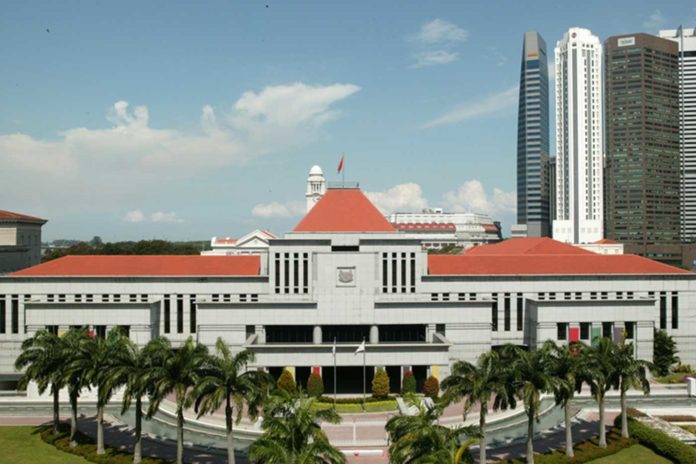Singapore’s 2020 Budget statement was delivered on Tuesday, 18 February, 2020. Its measures include the Stabilization and Support Package to stabilize the economy and support workers and enterprises, as well as moves to grow the economy and transform Singapore’s enterprises. It has also allocated specific budgets to deep tech development and cybersecurity.
Responding to challenges in a new decade
Mr Heng Swee Keat, Singapore’s Finance Minister, described Singapore’s 0.7% grow in 2019 as the weakest since the 2008 Financial Crisis. The COVID-19 outbreak at the beginning of 2020 is also poised to impact the economy, affecting the volume of air traffic, hotel occupancy rates and supply chains, given how Singapore’s economy “is so much more integrated with China’s”.
Stating that The Ministry of Trade and Industry (MTI) has downgraded the GDP forecast from between 0.5% to 2.5%, to between -0.5% and 1.5%, Mr Heng reminded listeners that the duration and severity of this outbreak and its impact on the global economy are still unclear, and thus economic impact may be worse than expected.
“Budget 2020 is a welcome relief for local businesses,” commented Khor Chern Chuen, Chief Operating Officer, SAP South East Asia. “While measures appear to provide short to medium term relief, they give businesses the opportunity to recalibrate and scale up for an uncertain decade ahead. The economic challenges we face in the first quarter of 2020 have disrupted supply chains, cashflows and the forward planning capabilities for businesses across most industries here. To overcome this, businesses need to harness Budget 2020 to accelerate digital transformation because innovation is the most effective strategy for hedging against volatility in the global economy.”
Enhancing digital transformation programs and cybersecurity
The Ministry of Communication and Information (MCI) deals directly with Singapore’s digital transformation initiatives, and its FY2020 budgetary provision is projected to be $1.04 billion, 7.2% lower than last year’s expenditure. Of this, 96.4% will be apportioned as operating expenditure and 3.6% as development expenditure.
42.7% will be allocated to the Infocommunications Media Development Authority (IMDA) Programme, 25.1% to the National Library Board (NLB) Programme, 24.1% to the MCI Headquarters Administration and Information Programmes, and 8.1% to the Cyber Security Agency (CSA) Programme.
The CSA aims to create a resilient and trusted cyber environment for Singapore, according to the government’s media statement. An operating budget of $81.24 million has been provided to CSA in FY2020 to carry out its functions. The vast majority of this will go towards the CSA’s 5-year Capability Build Up Plan, and represents a significant increase over last year’s expenditure.
Claribel Chai, Country Manager, Singapore, Palo Alto Networks, commented, “The Government’s commitment to Singapore’s cyber and data security capabilities and the safeguarding of its critical information infrastructure systems (CIIs), despite COVID-19 and current economic uncertainty, is a reflection of Singapore’s foresight and regional leadership when it comes to digitalisation.
“As more of our infrastructure, both public and private, go online and into the cloud, there is a greater need to examine our approach to designing our CIIs and keeping them safe. In fact, during challenging times, it has been observed that threat actors may often make use of public panic and disinformation to target users in order to steal security credentials or introduce malware. Hence, these additional resources from the budget will provide much-needed support to monitor industry systems such as those vital to the energy, water, telecommunications and transportation sectors and detect potential attacks.”
Stabilization and Support Package
Two special packages, with a total budget of $5.6 billion were introduced. The Care and Support Package is focused on providing additional, timely help to more households with cost of living. Meanwhile, the Stabilization and Support Package supports enterprises by defraying workers’ wage costs, providing economy -wide support to help enterprises with cash flow, and assisting sectors directly affected by COVID-19.
Supporting enterprises
The Package also provides economy-wide support to help enterprises with cash flow. A Corporate Income Tax Rebate for Year of Assessment 2020, at a rate of 25% of tax payable, capped at $15,000 per company will be granted and benefit all tax-paying companies.
Additionally, several tax treatments under the corporate tax system will be enhanced for one year. Mr Heng stated that he will allow enterprises “a faster write-down of their investments in plant and machinery, and renovation and refurbishment, incurred for Year of Assessment 2021.”
“This will put more cash in the hands of our enterprises,” he continued.
The Enterprise Financing Scheme’s Working Capital Loan component will also be enhanced for one year, with the maximum loan quantum from $300,000 to $600,000, and increase our risk-share on these loans to 80%, from the current 50% to 70%.
“With the large part of the risks taken up by the Government, I trust that our financial institutions will do their part to support viable SMEs,” said Mr Heng.
Besides these measures, support for tenants and lessees of government-managed properties was also announced, with opportunities to discuss more flexible rental payments such as installment plans with relevant agencies.
Additional support was also granted to sectors directly affected by COVID-19: tourism, aviation, retail, food services, and point-to-point transport services. These include Property Tax Rebates and a Temporary Bridging Loan Program for the tourism sector, as well as rental waivers to commercial tenants of government agencies such as HDB and NEA. A 15% Property Tax Rebate for qualifying commercial properties was also introduced to support establishments that operate in private property. “I strongly urge landlords to pass this on to their tenants by reducing rentals,” said Mr Heng.
Growing the economy
According to Mr Heng, Singapore is well-positioned to make the most of the changes in this period, with technology and innovation driving productivity and the next phase of growth. In line with his vision of Singapore as a “Global-Asia node of technology, innovation and enterprise”, Budget 2020 allocates a total of $8.3 billion over the next three years to support a Transformation and Growth effort, together with the sums allocated in previous years. This effort has three thrusts, enabling stronger partnerships, deepening enterprise capabilities and developing the workforce.
Enabling stronger partnerships
The first thrust is enabling stronger partnerships, going beyond Singapore’s extensive network of economic linkages by enhancing digital connectivity to create new value, and exploring new ways of doing business through the digitalization of finance.
Within Singapore, partnerships will also be strengthened to bring good ideas to global markets. The Research, Innovation and Enterprise 2020 Plan sustains investment into promising ideas, including AI, industrial robotics urban solutions and sustainability, and the biomedical sciences. Through partnerships among the Government, industry and the research community, these ideas can be turned into new businesses with global potential.
To help sustain Singapore’s progress, Trade Associations and Chambers will be supported through a pilot Executive‑in‑Residence program, to fund more than 10 TACs covering all sectors of the economy, to hire experienced executives and provide expert advice to enterprises in their industries.
Similarly, Merchants’ Associations that play a critical role in upgrading heartland enterprises, will receive support through a new Heartland Enterprise Upgrading Program to support Merchants’ Associations to drive transformation of heartland enterprises.
Deepening enterprise capabilities
The second thrust of Singapore’s Transformation and Growth is to deepen capabilities, at every stage of an enterprise’s growth. From starting up, to growing, to transforming further. Said Mr Heng, “Our enterprises must be the incubators of innovation, the crucibles for skills upgrading, and the creators of good jobs for our people.”
“Many of our enterprises are deepening their capabilities – by innovating, digitalizing, and venturing overseas,” he continued.
This year, an additional $300 million under the Startup SG Equity will be set aside, to catalyze investment into deep-tech startups and give them better access to capital, expertise and industry networks. Mr Heng expected this to draw in more than $800 million of private funding over the next 10 years.
Lim Fang How, Regional Director for Southeast Asia, Zebra Technologies, said that “while it is encouraging to see resources being put into spurring innovation through technology, it is equally important to ensure that investments are made in the right technology, that can help businesses make data-driven decisions swiftly and accurately.”
Enterprise Grow Package
At the same time, an Enterprise Grow Package was announced. we will enhance support for these enterprises through an Enterprise Grow Package. This Package aims to help enterprises identify business needs, adopt pre-approved digital technologies, and take the first steps to enter new markets.
First, a GoBusiness platform, a single touchpoint for enterprises to transact with Government digitally will be launched. Second, the SMEs Go Digital program will be expanded, to have Industry Digital Plans or equivalents, across all 23 ITM sectors, enabling enterprises to access pre-approved digital solutions. Third the Market Readiness Assistance grant will be enhanced by expanding the funding support and coverage, to include, for example, FTA consultancy.
According to Mr Lim, this package “is a commendable effort by the government to help local businesses gain competitive edge to contest abroad.”
Transforming Further
An Enterprise Development Grant, or EDG, where Enterprise Singapore provides integrated support for enterprises to innovate and internationalize, is already in place. To continue the growth of enterprises and drive deeper transformation as they mature, the EDG’s reach will be expanded, expecting to support about 3000 projects.
This year, an Enterprise Transform Package, with a focus on leadership will be introduced to support business leaders of promising small and medium enterprises in achieving the next bound of growth. The MOF will work with Institutes of Higher Learning, banks, industry experts and facilitate collaboration, with the aim of supporting business leaders of 900 enterprises in business transformation, with training and mentorship over the next three years.
Developing People
The Transformation and Growth effort also aims to develop Singapore’s workforce, enabling Singaporeans to access good jobs, earn good wages, and stay employable. To this end, measures to enhance the role of enterprises in the Next Bound of SkillsFuture were outlined.
These include a new SkillsFuture Enterprise Credit was introduced, to encourage employers to embark on the transformation of their workforce and enterprise in tandem. Employers can use this enterprise credit to defray 90% of out-of-pocket costs of business transformation, job redesign, and skills training. The SkillsFuture Enterprise Credit, at $10,000 per enterprise, will benefit over 35,000 enterprises, most of which will be SMEs.
The MOF will provide more support for job redesign. The Productivity Solutions Grant supports enterprises to adopt pre-approved digital solutions and equipment, and will be expanded to include job redesign consultancy services.
“After all, it is imperative for Singapore to continue leveraging its workforce as its most valuable and resilient asset, and invest in building a highly-skilled and competent workforce that is future-ready,” remarked Leslie Ong, Country Manager, Southeast Asia, Tableau Software. “This year is bringing to light the inflection point organisations are at – they are investing heavily in technology and transformation efforts, but the workforce is still playing catch-up.”
Additionally, the MOF will work with large anchor enterprises to support training for their sectors and value chain partners. Anchor enterprises are supported by many SMEs. Said Mr Heng, “by helping to raise the skills of workers in these SMEs, the entire supply chain benefits. We aim to partner up to 40 of such anchor enterprises to benefit 4,000 SMEs over the next five years.”
Lastly, workplace learning capabilities will be deepened by expanding MOE’s National Centre of Excellence for Workplace Learning, or NACE, launched at Nanyang Polytechnic in July 2018. MOE will expand NACE to two more IHLs over the next few years, and aim to benefit over 1,200 enterprises, especially SMEs.
Mr Heng concluded the budget by noting that Singaporeans “have enjoyed more than half a century of stability and prosperity because we have seized the opportunities from an increasingly open and interconnected world.”
“Every decade or so, when a test comes, we have rallied and passed it together,” he continued. The budget is aimed at dealing with near-term challenges and also within the new decade, as Singapore becomes a Global-Asia node of technology, innovation, and enterprise.
















